From digital workflow management to contact tracing mobile apps, technology and innovation have been integral parts of overcoming the challenges presented by COVID-19. To proactively address unforeseen obstacles in the future of the pandemic, the Philippine government called upon innovators and startups to collaborate with them during the launch of Shell’s Livewire platform on Friday, September 25.
Shell Livewire is the energy company’s global enterprise development program. Since 1982, it has supported more than 1,300 businesses in 20 countries execute their innovative ideas through connecting them to mentorship, technical expertise, financial assistance, and inclusion in Shell’s supply chain.
“New ideas are what drive the future of nation-building, but many aspiring entrepreneurs struggle to make those ideas a reality without the right support,” said Shell vice president for external and government relations Serge Bernal.
“In many cases the resources are there, but they can be hard to find without the right connection. We want to help fill that gap through the Shell Livewire platform, not only so that entrepreneurs can successfully execute their ideas, but also so that society can benefit from the solutions that they bring to the table.”
While the launch served as the official call for collaborators for the program, Shell Livewire already has existing programs in the grassroots level helping build livelihood capacities of coconut farmers in Quezon and seamstresses in Batangas. It was also instrumental in the establishment of an EcoBrick facility in Cagayan de Oro.
According to Bernal, Shell Livewire also recently gained six new participants under the program’s umbrella. The top three technology startups from the partnership with Ignite PH Innovation joined, including: Nextpay, a banking services platform that aims to make financial services more inclusive to small business owners and service providers; Nanotronics, a biomaterials startup that is using indigenous plants to help reduce plastic waste in a sustainable way; and uHoo, an air monitoring system that will transform the way that businesses manage spaces.
Three community enterprises are also participating in Shell’s LiveWire program this year: MagzWheel Furnitures, who specializes in converting rubber tires into useful items, such as furniture and apparel; Green Factory by Oro Handmade Innovations Inc., who manufactures handmade paper products and is pioneering a Green Factory Plan that aims to fine tune all factory processes to be environmentally friendly; and Eco Explorations PH, an eco-tourism business providing sustainable livelihood to locals while taking care of the environment and cultural heritage sites.
Partners from the Department of Agriculture (DA), the Department of Information and Communication Technologies (DICT), and the Department of Trade and Industry (DTI) joined the launch to give their insights on the opportunity areas for innovation in the country and how the government can support startups in developing their businesses.

DA Ambassadress for food security and founder of the AGREA Foundation Cherrie Atilano said that the DA is encouraging youths to enter agribusiness through the department’s Kapital Access for Young Agripreneurs (KAYA) financing program. The digital platform offers zero-interest loans of up to PHP 500,000 to Filipinos between 18 to 30 years old who plan to start an agribusiness.
“Millions of OFWs are coming back to the country and a lot of them have invested in land,” said Atilano. “But since this is their first time in agriculture, we are working with the DTI to provide support through training. There is also a partnership with the DOST to help them if they would rather go into processing rather than production.”
DICT Director Emmy Delfin discussed the department’s plan to roll out the Innovative Startups and Acceleration Program. The initiative will develop a web platform called the Startup Philippines Portal, which will streamline business registration, make shared services more accessible, and promote more advanced investor-and-collaborator matching.
“We know that the new normal calls for new ways of governance, and ICT is helping the way the government, the private sector, and civil society engage and collaborate,” said Director Delfin. “There is a need for new ideas, strategies, and policy considerations to meet the emerging challenges that have been caused by the crisis.”
Nelly Dillera, executive director of the DTI’s training arm, the Philippine Trade Training Center, said that aside from digitalization capabilities, Filipino firms need business skills training if they are to become competitive in international trade. She said, “The smartest and the resilient are the ones who will survive. We would like to focus on the startups.”
Director Dillera discussed the DTI’s Global MSME Academy (GMEA), which provides a number of enterprise training and development services to both MSMEs and aspiring startups. Through GMEA, the DTI not only offers capacity building for back office operations like accounting and human resources, it also provides participants office space and prototype product development.
Bernal enthused about the partnerships: “Shell Livewire seeks to be a platform for connecting entrepreneurs to the assistance that they need, and we are very excited to have all these partners work with us towards building the nation. During these extraordinary circumstances, we need extraordinary solutions. At Shell, we hope to cast a wider net in the search for these solutions through this initiative.”
